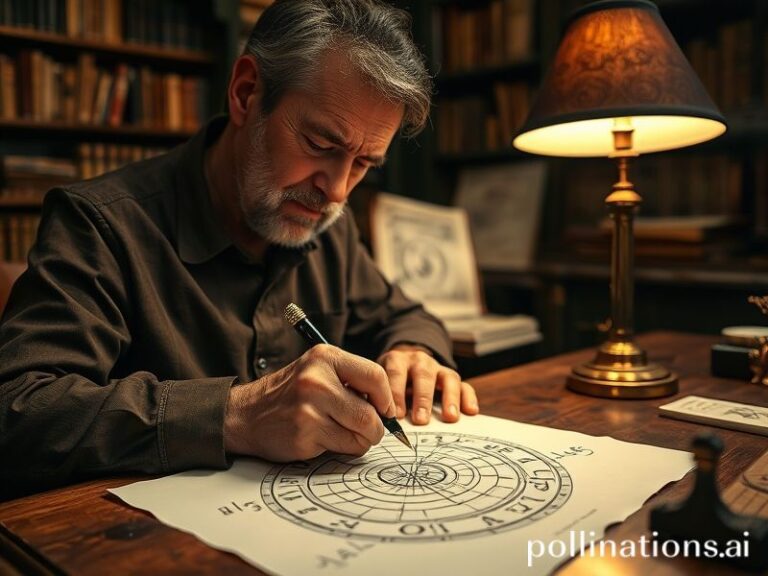The Last Eastern-European Tennis Relic: How Márton Fucsovics Became a Geopolitical Shuttlecock
Márton Fucsovics, the tennis journeyman from the Hungarian plains, is living proof that the world’s most individual sport can still be a referendum on geopolitical karma. While Wimbledon’s strawberries wilt under Brexit paperwork and Wimbledon’s strawberries wilt under Brexit paperwork, Fucsovics has quietly become the last Eastern-European standing who still plays like communism collapsed last week and the Wi-Fi hasn’t been installed yet. He’s the sort of man who looks as if he’s been personally wronged by every line judge since 1989, and yet he keeps winning just enough to remind us that history never really ends—it just gets seeded into the same half of the draw as Novak Djokovic.
At 32, Fucsovics is older than TikTok, younger than NATO expansion, and exactly the age when most tennis pros pivot to coaching spoiled teenagers in Dubai. Yet there he was last month in Belgrade, dragging the entire ATP marketing department—whose idea of cultural diversity is a sushi stand at Indian Wells—into the Danube basin. The Serbs were promised another coronation for their local deity Djokovic; instead they received a three-set masterclass in Magyar fatalism. Fucsovics lost, naturally, but not before demonstrating that the Iron Curtain may have rusted away, yet the rust still stains the baseline.
For the uninitiated, Fucsovics is ranked somewhere in the thirties, a numerical purgatory that airlines understand better than fans: close enough to business class upgrades to taste the free Champagne, far enough back to smell the jet fuel. In global terms, he is Hungary’s most successful athlete who isn’t a water-polo goalkeeper or a Rubik’s cube. This means his matches are broadcast at 3 a.m. in Tokyo, buried under sumo reruns, while in New York they’re preempted by cryptocurrency ads promising to turn your 401(k) into a non-fungible mood ring. Nevertheless, his forehand—flat, angry, and visibly nostalgic for the silent-majority era—travels at 160 km/h, roughly the speed at which Hungarian democracy is currently reversing.
The broader significance, if we’re being honest, is that Fucsovics represents the last generation who remembers when “Made in Europe” applied to humans as well as cars. His biography reads like a classified ad for Cold War clearance: born in Nyíregyháza, trained in Nick Bollettieri’s Florida tennis gulag, funded by EU development grants that will probably be clawed back by Brussels accountants next quarter. Every time he upsets a top-ten player, a Brussels bureaucrat spills his fair-trade coffee; every time he loses, Viktor Orbán uses the match statistics in a speech about national resilience. The poor man is essentially a geopolitical shuttlecock, only heavier and slightly more Hungarian.
Meanwhile, the tennis-industrial complex keeps pushing its glossy narrative of a borderless sport where Kyrgios does podcasts and Federer sells Swiss chocolate to the Chinese. Fucsovics, bless his Slavic cheekbones, refuses to cooperate. His post-match interviews are terse, vaguely existential, and sound like they’ve been translated back and forth through three languages and one historical trauma. Asked recently about his ambitions, he replied, “I just want to play good tennis.” Somewhere, a brand consultant had an aneurysm.
Of course, the cruel joke is that individual excellence no longer guarantees individual reward. Fucsovics could win the French Open and still be detained at Charles de Gaulle by a customs officer who thinks Hungary is a suburb of Bucharest. In the age of influencer athletes, he remains stubbornly analog: no OnlyFans, no NFTs, just a two-handed backhand and the haunted expression of a man who’s read the fine print on globalization.
Still, every so often, when the draw opens like a rusted fire escape and the stars align with a kind of cosmic indifference, Fucsovics reminds us that history isn’t always written by the victors—sometimes it’s footnoted by the stubborn. And footnotes, as any academic will tell you while crying into their adjunct salary, can be surprisingly durable.







